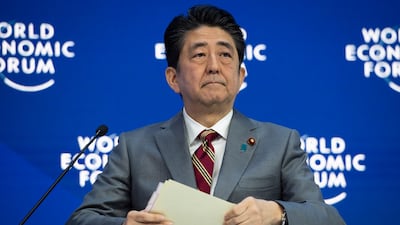Japan's Prime Minister took to the stage at the World Economic Forum on Wednesday to make a simple pitch to global businesses, politicians and would be investors – Japan’s economic troubles are behind them.
Praising his economic style, dubbed Abenomics, for salvaging a country long plagued by slow growth, poor demand and negative interest rates, Shinzo Abe said that since he took office "despair was wiped out by renewed hope, … [and] hope is the most important factor for growth."
Mr Abe laid out his plans for Japan's chairmanship of the G20, a group of the largest global economies, saying that data was a “great gap buster” when it came to trying to tackle major challenges from global poverty to climate change.
Mr Abe proclaimed an ambitious legacy for the upcoming Osaka summit in June. "I'd like Osaka G20 to be long remembered as a summit which started worldwide data governance," he said.
"As we all know that for decades to come it will be digital data driving our data forward," he said, adding that trillions of bites of data were being created every day.
Mr Abe described a system where non-personal data could flow across borders, including medical data, sparking a fourth industrial revolution.
"It is no longer [financial] capital but data that drives everything, helping to fill the gap between the rich and the less privileged," he said.
“We will be inviting to Japan [the] topmost experts in science and technology from G20 member countries to combine forces in accelerating innovation,” he said.
"We must make data a great gap buster through AI, IT and robotics."
The Japanese leader also called for more radical approaches to tackling climate change, particularly in the oceans.
"We must invite more ... disruptive innovations before it is too late," he said. "In Osaka, I'd like to create a shared sense that it takes a worldwide commitment to reduce not to increase plastics into the seas," he said.
Mr Abe said his government wants to make the production of hydrogen cheaper than natural gas, cutting the cost of the potential alternative fuel source by more than 90 per cent.
Five years since Mr Abe last spoke at the World Economic Forum he contrasted the economic quagmire he inherited with the current state of Japan.
"Many I now solemnly declare [that] defeatism about Japan is defeated," Mr Abe said, eliciting ripples of applause from the audience.
He said the working age of Japan has fallen and praised the expansion of women in the labour force.
"We now have 2 million more. Repeat – 2 million more women in work," saying the women inclusion rate was higher than in the United States.
He said there are now more companies seeking jobs than people unemployed and said wages had increased 2 per cent year on year.
Abenomics is the name for policies pursued by the Japanese leader since he took office after the 2012 election. It is based on his “three arrows”, described as a mix of reflation, government spending and growth pursuit to end decades of sluggish performance.
But the Japanese leader also called for reform of the WTO and the return of trust to free trade.
"Japan is determined... to enhancing the free open and rules-based international order," he said, pointing out free trade deals with the European Union and the TPP11 – a deal between Australia, Brunei, Canada, Chile, Japan, Malaysia, Mexico, New Zealand, Peru, Singapore, and Vietnam.
"I call on all of you to rebuild trust in the system of international trade," he said, arguing for the EU, Japan and the United States to push reforms.
The World Economic Forum is an annual opportunity for business leaders, politicians and NGOs to discuss the future of the global economic order.
But this year, the forum will be trying to define the next iteration of globalisation – the system that conferred immense wealth on many of the forum's attendees.
The theme of Globalisation 4.0 will see discussions covering climate change, automated labour, global reskilling and sustainable development.
On Tuesday, the forum saw addresses from US Secretary of State Mike Pompeo, by video link, and Brazil's newly-inaugurated President Jair Bolsonaro.
German Chancellor Angela Merkel and Chinese Vice President Wang Qisham were also due to speak on Wednesday.
_______________
Davos 2019
Mike Pompeo says Middle East coalitions vital to countering Iran
Postcard: Geopolitical prospects take the limelight in Switzerland
UAE signs deal to host research centre of the future in Dubai
Sir David Attenborough warns of limitless environmental harm
Davos chief Klaus Schwab sends environmental warning in opening address
____________
But there are also notable faces missing from the event.
US President Donald Trump cancelled his trip as the ongoing US government shutdown demands greater attention – and the travel and expense arrangements would not be paid.
Meanwhile, British Prime Minister Theresa May will stay in the UK to focus on Brexit – on which Mr Abe has warned against a no deal – and Zimbabwean President Emmerson Mnangagwa and French President Emmanuel Macron will not attend as they contend with their own large scale protests back home.
But Japan's prime minister avoided bringing up one notable Davos absentee – former Nissan boss Carlos Ghosn.
The Brazilian businessman of Lebanese decent is currently being held in Japan on charges of financial misconduct and years of under-reporting his salary. He has described being subject to constant interrogations and "harsh treatment".
The car industry chief has been held in custody for more than two months and has been denied bail on the grounds he might tamper with evidence or attempt to flee.

